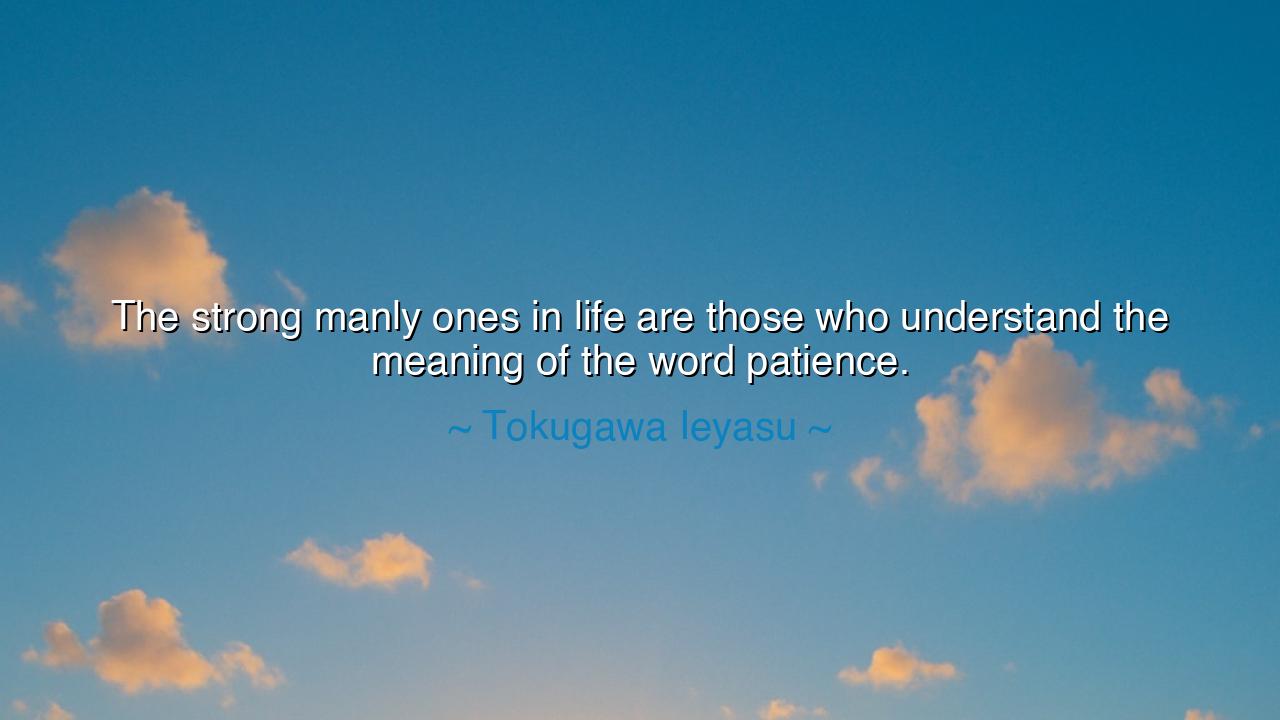
The strong manly ones in life are those who understand the
The strong manly ones in life are those who understand the meaning of the word patience.






Hear the words of Tokugawa Ieyasu, the great shōgun who forged peace after centuries of war in Japan: “The strong manly ones in life are those who understand the meaning of the word patience.” This is no light phrase, but the distilled wisdom of a man who waited, endured, and at last triumphed. For Ieyasu, who lived through betrayal, exile, and endless battles, learned that strength is not measured by the speed of the sword alone, but by the endurance of the spirit. Patience is not weakness—it is the iron will to endure storms without breaking, to restrain impulse, and to seize victory when the time is ripe.
When Ieyasu speaks of the strong, he does not point to those who roar like tigers in the heat of passion, but to those who move like mountains, unmoved by rage or haste. He saw many warriors undone not by their enemies, but by their own lack of restraint—men who sought glory too quickly, who rushed into battle before the hour was right, who mistook fury for courage. Their strength was fleeting, their power shallow. The truly manly and enduring, he says, are those who master themselves, who bend but do not break, who wait with resolve until fortune bends toward them.
His own life was proof of this teaching. Born into turmoil, Ieyasu as a child was sent away as a hostage to rival clans. He could have burned with resentment, he could have sought reckless escape, but he endured. For decades he served under greater lords, biding his time. Others, impatient, rose swiftly only to fall just as swiftly. But Ieyasu waited, step by step, until at last he emerged as the unifier of Japan, establishing the Tokugawa shogunate, which would bring peace to the land for over 250 years. This was not the triumph of brute force, but the victory of patience.
History gives us many mirrors of this truth. Consider George Washington at Valley Forge. His army was starving, ill-equipped, and on the edge of collapse. A lesser man would have rushed into a desperate battle to reclaim morale. But Washington endured the long winter, strengthening his men, training them slowly, waiting for the right moment. In patience he preserved his army, and in patience he won the war. Like Ieyasu, he proved that the greatest victories belong to those who endure hardship without surrender.
The origin of Ieyasu’s words lies in the crucible of war, but their meaning stretches to all of life. For every man and woman faces battles—not always with swords, but with hardship, disappointment, and delay. We are all tempted to demand instant results, to force destiny before its season. But the shōgun reminds us: the strong are not those who rush blindly, but those who trust the slow work of time. Patience is not passive; it is the greatest form of discipline, the steady fire that endures when all else fades.
The lesson is clear: true power lies in self-mastery. The world will test you with delays, betrayals, and trials. If you answer only with haste, you will exhaust yourself and fail. But if you cultivate patience, you will endure where others fall, and when the moment comes, you will be ready. The oak does not grow in a day, yet it stands for centuries. So too must your character grow slowly, through the discipline of waiting and enduring.
Practical action follows: when hardship comes, do not rush to escape it—ask instead what it can teach you. When success delays, do not despair—continue to build, quietly, steadily, until the hour arrives. Train your heart in endurance as a warrior trains his body, so that when fate calls, you are unshaken. Patience is the secret strength that turns suffering into victory, delay into destiny.
Thus, Tokugawa Ieyasu’s words remain eternal: the truly strong are those who understand and embody patience. It is not the fury of a moment, but the quiet strength of years, that shapes greatness. Remember this, O listener: haste burns quickly and dies, but patience endures and triumphs. Be as the mountain—calm, immovable, patient—and in the end, victory shall be yours.






AAdministratorAdministrator
Welcome, honored guests. Please leave a comment, we will respond soon